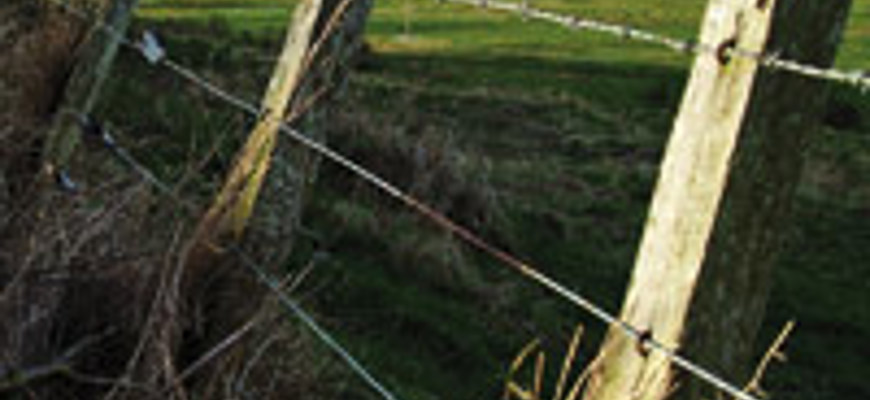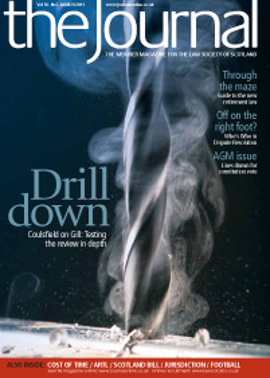Lacuna manufacturing

The previous briefing (Journal, December, 49) outlined some anticipated reforms to the Agricultural Holdings (Scotland) Acts 1991 and 2003 that were then in draft. These arose from proposals made by the Tenant Farming Forum, following a request by the Cabinet Secretary for Rural Affairs to identify practical solutions to a number of perceived faults with the two Acts.
Since then, the draft order has undergone consultation and further revisions. A final draft order has now been laid before the Scottish Parliament for approval, with commencement likely before the May elections. The Public Services Reform (Scotland) Act gives power to ministers to amend primary legislation through statutory instruments to remove or reduce burdens on any person. In many respects the proposed order will do so and is very welcome.
Fixed equipment obligations
This article comments on article 9 of the order. This amends s 16 of the 2003 Act, dealing with the liability of landlords and tenants in relation to fixed equipment under a limited duration tenancy or short limited duration tenancy. To paraphrase, the article provides that:
- the landlord undertakes within six months to provide fixed equipment to enable the tenant to maintain efficient production as respects the land let and to put it into the condition specified in the schedule (see below); and during the tenancy to effect renewal or replacement of such fixed equipment as may be rendered necessary by natural decay or fair wear and tear;
- a schedule must be incorporated in the lease, in the absence of agreement at the joint expense of the landlord and tenant, specifying the fixed equipment and its condition;
- if the fixed equipment is varied during the lease the schedule may be amended;
- the tenant is liable to maintain the fixed equipment in as good a state of repair (excepting natural decay and fair wear and tear) as it was in immediately after it was put into the condition specified in the schedule, or if improved, provided, renewed or replaced during the tenancy, immediately after that takes place.
Imperfect remedy
While these provisions represent a clear improvement on s 16, they are expressed in such a way as to create a number of lacunas which will, no doubt, keep the Land Court busy in due course. These include:
- There is no provision that, when a landlord provides suitable fixed equipment at the outset, this exhausts the obligation to provide fixed equipment. There must be a risk of a tenant thereafter asking for additional fixed equipment.
- Landlords will be required to provide fixed equipment within six months of the start of the lease except where other legislation, e.g. planning law, prevents them from so doing. In this case the landlord has to provide the fixed equipment as soon as reasonably practicable. That is all very well, but it does not cover all eventualities beyond the landlord’s control which may prevent fulfilment of the obligations, e.g. a strike, or lack of materials, or severe winter weather following a Martinmas entry.
- New leases require to have a schedule specifying the fixed equipment the landlord is providing and its condition. There is no guidance to what condition is to be regarded as suitable. Is it the best condition, or tenantable condition, or simply workable condition?
- Furthermore, the landlord’s obligation is to provide fixed equipment and put it into repair within six months of commencement of the tenancy. Yet the schedule is to form part of the lease, which will normally be completed before commencement. What, therefore, is the schedule to record? Presumably fixed equipment which, at the time of the lease, is to be provided, improved or repaired by the landlord.
- If that equipment is varied during the lease for any reason, for example by being repaired or replaced, or a building is added or one becomes redundant, the draft order simply says that the landlord and tenant “may” agree a variation to the schedule. The lack of compulsion is illogical. The schedule is the starting point for assessing landlord’s and tenant’s responsibilities for the fixed equipment. If the equipment is varied but the schedule is not amended these obligations may apply to imaginary equipment and circumstances.
Sadly the order is yet another missed opportunity to create the clarity which is the objective of the order in particular and the 2010 Act in general. To reiterate December’s briefing, agricultural law is becoming a jigsaw puzzle and many of the pieces are missing or have never been cut at all. This is not a problem which is unique to agricultural law, but in an area where freedom of contract is so heavily restricted, the absence of clarity is a major problem for us all.
In this issue
- The case for full disclosure of laboratory case files
- Why join the Scottish Family Law Association?
- Above board
- Time to be counted
- Taking out rejections
- Updating the constitution
- Every bit helps
- Retiring the default age
- Keeping a grip on cash
- Watch this space
- The diehards
- Win-win ways
- "Virtual fair" opens for career options
- Law reform update
- Society's in-house work under scrutiny
- Watching over the constitution
- All aboard life's U-bend
- Ask Ash
- Working to advantage
- Frauds and scams beware
- Lay help... official
- Lacuna manufacturing
- This time it's NOT personal
- Fairness and trust
- Pensions: redefining value
- Sharing the spoils
- World IP Day 2011 approaches
- Life v reputation
- Book reviews
- ARTL, by degrees
- Contaminated land - the story continues






